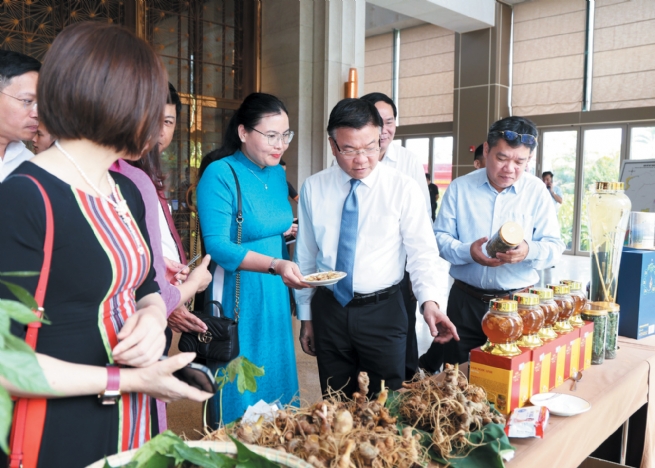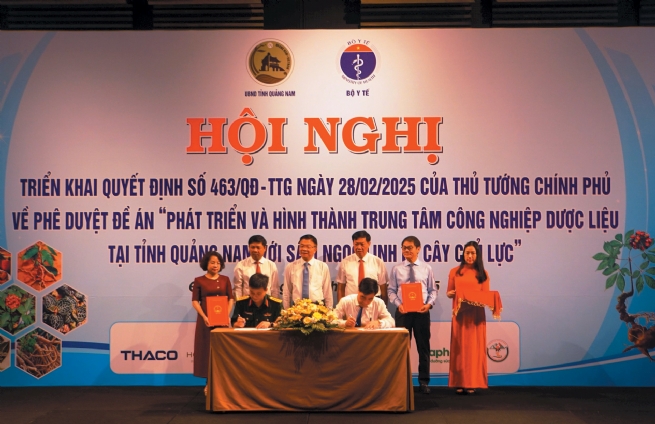At a recent conference in Quang Nam province on the Prime Minister's Decision to approve the project for developing a medicinal herb industry hub, with Ngoc Linh ginseng as the key crop, Deputy Prime Minister Le Thanh Long emphasized that the project holds great expectations, aiming to achieve many goals, contributing to the growth of the medicinal plant industry and the development of both Quang Nam province and Vietnam as a whole.

Deputy Prime Minister Le Thanh Long attends a presentation on Ngoc Linh ginseng
Commitments to developing a medicinal plant industry hub
Deputy Minister of Health Do Xuan Tuyen said that Vietnam has great potential to develop its medicinal plant industry. However, for many years, the industry has not fully tapped into this potential, relying mainly on raw material exploitation, resulting in low added value and limited competitiveness in the international market.
“Developing a modern pharmaceutical industry hub, along with deep processing and brand building, is an urgent priority - especially in the Central Highlands, where soil conditions and vast areas of medicinal herbs are highly suitable,” said Mr. Do Xuan Tuyen.
So how should the Prime Minister's Decision on developing a medicinal herb industry center in Quang Nam be implemented?
According to Mr. Tuyen and many delegates, it is essential to attract investment in the cultivation and processing of medicinal herb products. “It is important to support the establishment of cooperatives and associations for the production and consumption of products made from Ngoc Linh ginseng and other medicinal herbs,” a representative from the National Institute of Medicinal Materials under the Ministry of Health emphasized.
Mr. Tran Ba Duong, Chairman of the Board of Directors of Truong Hai Group Corporation (THACO), a multi-industry group with strong capabilities in high-tech agriculture and supporting industries, pledged that THACO will accompany and actively support the implementation of the project approved by the Prime Minister. “We consider this a business mission for the nation,” Mr. Tran Ba Duong said.
General Director of OPC Pharmaceutical JSC Pham Thi Xuan Huong affirmed that a medicinal herb industry center is essential, as individual efforts can’t build a full value chain. OPC will develop high-tech cultivation zones, ensure product outlets for farmers, and invest in an extraction plant in Quang Nam.
Mr. Nguyen Huy Van, Deputy General Director of Traphaco, one of the few Vietnamese enterprises to successfully build a standardized medicinal plant value chain with strong export and international cooperation capacity, suggested establishing a Center for the Conservation and Development of Herbal Culture of Ethnic Groups in Quang Nam province. This center would include a model medicinal plant garden representing ethnic communities. A Traphaco representative also stressed the importance of developing specific policies to expand the medicinal herb market and ensure stable product demand, avoiding situations like in 2018 when outbreaks of dengue fever caused a sudden shortage of herbs such as Eclipta prostrata and Plantago asiatica.

Representatives of enterprises sign an MoU with Quang Nam province on the development of medicinal herbs and Ngoc Linh ginseng
Just the beginning
Concluding the conference, Deputy Prime Minister Le Thanh Long emphasized that medicinal herbs are valuable natural resources, playing an increasingly important role in healthcare and the protection of human health.
With rich, diverse natural resources and flora distributed nationwide, Vietnam is one of 15 countries globally recognized on the medicinal herbs map, boasting over 5,000 plant species with medicinal properties.
The Party and State of Vietnam have always prioritized medicinal herbs, recognizing them as a sector with great potential, not only contributing to public healthcare but also offering a sustainable path for the agricultural economy. According to Le Thanh Long, this focus is well-founded.
In recent years, numerous policies, guidelines and mechanisms for the development of medicinal herbs have been introduced, he noted. He emphasized that the Prime Minister’s approval of the project to develop a medicinal herb industry hub in Quang Nam province, with Ngoc Linh ginseng as the key crop, is just the starting point, not the final destination.
"There is still much work to be done in the coming period, and we must organize and implement it effectively," said Le Thanh Long.
In addition to Vietnam's general strengths, Quang Nam has its own advantages, featuring a diverse range of medicinal plant species and families, including 36 species currently listed in the "Vietnam Red Book."
Quang Nam is recognized as the capital of Ngoc Linh ginseng, with over 15,000 ha planned for its cultivation. The province has unique characteristics and favorable conditions for developing valuable medicinal herbs, including Ngoc Linh ginseng.
Therefore, Deputy Prime Minister Le Thanh Long said that this project holds great expectations, with numerous goals to achieve. It will contribute to the development of the medicinal plant industry, as well as to the growth of Quang Nam province and Vietnam as a whole.
The project clearly outlines six key groups of tasks and solutions: policy institutions, development planning, establishing and expanding cultivation areas, attracting investment, scientific research and technology transfer, and information, propaganda and promotion. It also defines specific responsibilities for ministries, agencies and local authorities.
To effectively implement the project, Le Thanh Long emphasized that, first and foremost, in terms of mechanisms and policies, Quang Nam and neighboring areas with strengths in planting, processing and commercializing Ngoc Linh ginseng must be the starting point. It is essential to proactively review and identify the policies needed as the medicinal herbs industry and the Ngoc Linh ginseng product chain continue to grow.
"The Government is ready to listen and, together with colleagues, assess what more specific mechanisms and policies are needed," Le Thanh Long said, adding that proactive coordination between provinces is essential. "This is a long-term vision and a major undertaking, not something confined to a single locality."
The Quang Nam Provincial People's Committee will coordinate with relevant localities to develop and implement solutions that link and advance the production, processing, and trading chain of medicinal herbs and products.
Within its authority, Quang Nam and other regional localities will promptly finalize and announce land use plans and related strategies, as well as determine suitable sites. Special attention will be given to investing in the completion of the technical infrastructure for the medicinal herb center area. The medicinal herb center should be viewed as a region or zone, not just an institution.
Efforts should be made to diversify cooperation forms, financial resources, and human resources to promote and attract investment. Advanced technology and artificial intelligence should be widely applied to the medicinal herb production process. Additionally, focus should be placed on developing, training and nurturing high-quality human resources to meet the labor demands of businesses and investors involved in the cultivation, exploitation and processing of medicinal herbs.
Referring to the coordination of the four stakeholders (the State, enterprises, scientists and farmers), Deputy Prime Minister Le Thanh Long emphasized the crucial role of Quang Nam province. He asked, "How can we establish a mechanism for them to meet regularly?" suggesting the organization of periodic conferences, as many policy mechanisms are proposed from this platform. Expressing his satisfaction with the signing of cooperation agreements, he urged the province’s enterprises to collaborate toward a common goal, saying, “Once signed, we must implement them swiftly.” He expressed confidence that, "With the determination and efforts of all of us, the signed agreements, and the Government's support, the project will become a reality, significantly contributing to making Quang Nam the national pharmaceutical industry hub and supporting the country's socio-economic development goals.
Source: Vietnam Business Forum